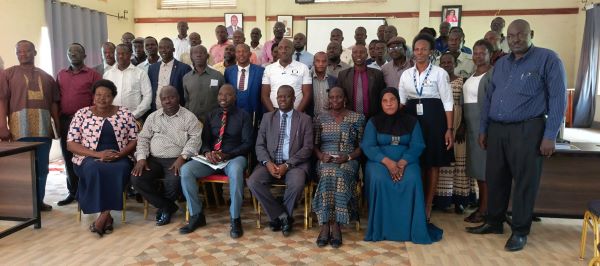LIRA CITY, December 15, 2024 – Officials from the Ministry of East African Community Affairs [MEACA] have advised political leaders and businessmen in Lira City and Lira district to take advantage of trade opportunities available at Uganda’s border points, and beyond.
This advice was shared during a stakeholder engagement held recently at Lira City Council Hall, aimed at sensitising political leaders, businesses, and farmers about the trade opportunities that arise from East African Community [EAC] integration.
Godfrey Oundo Ongwabe, the National Chairperson of the Uganda Cross Border Traders Cooperative Union, explained that there is a pressing need to boost agricultural production to facilitate trade at the border points.
“Our main purpose for coming to Northern Uganda is to equip the Parish Development Model [PDM] beneficiaries with market information. We want farmers to take advantage of the business opportunities at the border posts,” he said, adding that EAC Partner States are receptive to Uganda’s commercial produce like maize, beans, milk, and others.
Despite challenges such as fluctuating exchange rates and non-tariff barriers, Oundo highlighted that lack of awareness is a key obstacle affecting trade at Uganda’s border points.
“The biggest issue is the lack of information about the opportunities at the border points. People hear about the East African Community and COMESA, but they don’t understand what these terms mean or what they entail. This means there is no information circulating about these two Communities,” he said.
Businessmen and leaders from both Lira City and Lira district, who expressed concerns about key challenges affecting their participation in regional trade.
Geoffrey Obia, a businessman in Lira City who trains youth and women in liquid soap making, explained that accessing the EAC border points remains a struggle for some traders.
“When I travelled to DR Congo via Arua to buy palm oil, one of the ingredients for making liquid soap, I encountered significant challenges at the official border. I had to resort to using a boda boda to enter DR Congo through an ungazetted border point. I then had to find another route to return to Uganda, which was very discouraging. I haven’t gone back since,” Obia said.
Josephine Alobo, the Lira District Commercial Officer, emphasised the need for effective communication about trade opportunities at the border points, as well as ensuring the safety of traders and their merchandise when they are in other EAC Partner States.
“While we advocate for East African Integration, we also need to protect our people, as some EAC Partner States, such as South Sudan, are not yet very safe for our traders. Due to a lack of information, only a few people benefit from cross-border trade. There is also a need to add value to the products being exported,” Alobo said.
Patrick Ogwal Enyema, the Lira District Finance and Administrative Secretary, stressed the importance of standardising Kiswahili and harmonising political systems across the region to facilitate trade. “Recently, I was in Nairobi and struggled to express myself in the language. We need to standardise the language. All political leaders have different ideologies, which lead to conflicts that affect trade within the EAC,” Ogwal Enyema said.
Sam Atul, the Lira City Mayor, argued that trade at border points and across the EAC countries would be greatly enhanced if the EAC Monetary Union were established. He suggested that the current situation, where each Partner State has its own currency and traders are forced to transact in US dollars, further inflates the cost of doing business.
“It is my hope that our leaders at the national level will act swiftly and collaborate with the other EAC countries to establish a single East African currency. This would significantly reduce the cost of doing business within the region,” Atul said.
In response to some of the concerns raised by people from Lira, Matia Etedu, the Regional Integration Officer at MEACA, assured the audience that efforts are underway to ensure Ugandans learn the Kiswahili language which is commonly spoken in Kenya, and Tanzania.
Etedu also confirmed that the ministry would continue its sensitisation campaigns to raise awareness about business opportunities in the EAC and address challenges that hinder trade within the region.
The EAC Partner States include Uganda, Kenya, Tanzania, Rwanda, Burundi, the Democratic Republic of Congo, Somalia, and South Sudan.
Buy your copy of theCooperator magazine from one of our countrywide vending points or an e-copy on emag.thecooperator.news
